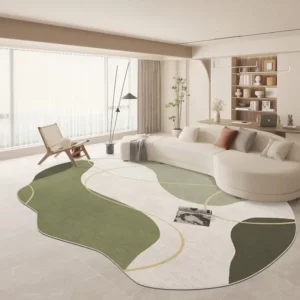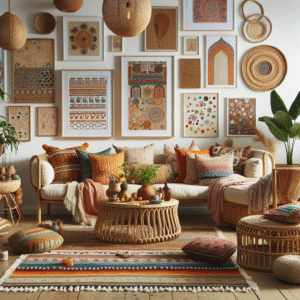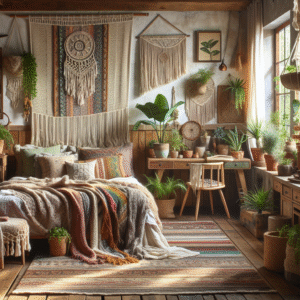Have you ever walked into a room and felt an instant sense of warmth and comfort? The right textiles play a crucial role in creating such inviting atmospheres. Unfortunately, many popular options come with environmental and ethical costs that we often overlook. In this article, we will explore the significance of ethically sourced textiles for cozy spaces, helping you make informed decisions that not only benefit your home but also support sustainable practices.
By tapping into ethically sourced textiles, you can enrich your living space while knowing that your choices contribute to a more sustainable future. This article will cover various aspects, including types of textiles, brands that prioritize ethical sourcing, styling tips, and actionable steps to transition your home into a cozy haven of sustainability.
What Are Ethically Sourced Textiles?
Ethically sourced textiles refer to fabrics produced through methods that minimize harm to people, animals, and the environment. This includes a strong focus on fair labor practices, reduced carbon footprints, and the use of sustainable materials.
Key Characteristics
- Fair Labor Practices: Ensuring workers are treated fairly and paid a living wage.
- Sustainable Materials: Utilizing organic cotton, hemp, bamboo, and other eco-friendly fibers.
- Low Impact Dyes: Employing natural dyes to minimize chemical pollution.
Types of Ethically Sourced Textiles
When considering textiles for cozy spaces, you’ll find a broad array worth exploring. Here are some of the most prominent types:
Organic Cotton
Unlike conventional cotton, organic cotton is grown without synthetic pesticides or fertilizers, making it a better choice for your health and the planet.
Hemp
This rapidly renewable resource requires little water and no pesticides, ensuring a low environmental impact.
Bamboo
Bamboo is not just soft and luxurious; it’s a sustainable option that grows fast and does not require harmful chemicals for growth.
How to Source Ethically
Sourcing ethically involves a bit of research and mindfulness. Here are practical steps you can take:
Research Brands
Look for transparent brands that provide details about their sourcing and manufacturing processes.
Read Certifications
Many brands will have certifications like Fair Trade, GOTS (Global Organic Textile Standard), or OEKO-TEX. These credentials can give you assurance about their practices.
Styling Your Cozy Space with Ethically Sourced Textiles
Once you’ve sourced ethically, it’s time to make your space shine. Here are some tips:
Layer Textiles
Combine different textures like throws, cushions, and rugs to create depth and warmth.
Color Coordination
Choose a color palette that soothes the senses. Natural hues often work well for a cozy feel.
Case Studies: Brands Leading the Way
1. Coyuchi
This brand focuses on organic textiles, offering a range of cozy home goods that are ethically sourced and beautifully crafted.
2. West Elm
With their commitment to fair trade and sustainability, West Elm provides ethically made furniture and home textiles that brighten any space.
Tools & Resources for Ethical Sourcing
Consider these tools and resources to guide your journey:
- Ethical Consumer: A consumer guide dedicated to ethical shopping.
- Better Cotton Initiative: A program for the sustainable cotton industry.
Frequently Asked Questions
What is the difference between organic and conventional textiles?
Organic textiles are produced without synthetic chemicals, prioritizing environmental health and worker welfare, while conventional textiles often rely on harmful pesticides and fertilizers.
Why should I care about ethically sourced textiles?
Choosing ethically sourced textiles helps support fair labor practices and environmental sustainability, positively impacting communities and ecosystems.
How do I know if a brand is ethical?
Research brands for transparency in sourcing, look for certifications, and read reviews to understand their practices better.
Are ethically sourced textiles more expensive?
While they can be pricier, the investment often reflects fair wages and sustainable practices that benefit the planet and society in the long term.
Can I find ethically sourced textiles in big-box stores?
Yes, some large retailers now carry ethically sourced options but do your research to ensure they meet standards you’re comfortable with.
Conclusion & Next Steps
We’ve explored the importance of ethically sourced textiles for creating cozy spaces that are both inviting and sustainable. By prioritizing these materials, you are taking important strides towards a more ethical and sustainable lifestyle. Remember to research brands, get acquainted with certifications, and dive into the world of styling with intention.
Ready to make a difference? Start transforming your home today. For more insights, check out our related articles on sustainable decor and organic living.
Content Disclaimer
The information provided in this article is for educational purposes only and not professional advice. Always consult relevant experts for personalized guidance on textiles and sustainability.
Categories
- Accent Walls & Ceilings (33)
- Art Curation & Gallery (48)
- Bedding Style Trends (46)
- Bedroom Makeover (53)
- Bohemian & Eclectic Styles (33)
- DIY & Budget-Friendly Decor (32)
- Eco-Friendly Design (32)
- Furniture Care (54)
- Home Decor & Design Ideas (115)
- Home Wellness Spaces (32)
- Integrated Outdoor Living (32)
- Kids and Nursery Decor (33)
- Living Room Decor (53)
- Minimalist & Japandi Style (35)
- Mix & Match Techniques (51)
- Modern & Contemporary Design (32)
- Rug Sizing & Placement (52)
- Seasonal Home Decor (55)
- Small Space Solutions (37)
- Wall Art & Painting Tips (55)
Recent Comments
Archives
Product Gallery
-
 Large Area Green Rugs for Bedroom Nordic Living Room Decoration Shaped Carpet Irregular Plush Lounge Rug Home Thick Washable Mat
Rated 5.00 out of 5$57.14 – $360.30Price range: $57.14 through $360.30
Large Area Green Rugs for Bedroom Nordic Living Room Decoration Shaped Carpet Irregular Plush Lounge Rug Home Thick Washable Mat
Rated 5.00 out of 5$57.14 – $360.30Price range: $57.14 through $360.30 -
 Nordic Style Rugs for Bedroom Morandi Living Room Decoration Carpet Large Area Geometry Lounge Rug Home Cloakroom Non-slip Mat
Rated 5.00 out of 5$41.04 – $621.62Price range: $41.04 through $621.62
Nordic Style Rugs for Bedroom Morandi Living Room Decoration Carpet Large Area Geometry Lounge Rug Home Cloakroom Non-slip Mat
Rated 5.00 out of 5$41.04 – $621.62Price range: $41.04 through $621.62 -
 Irregular Shapes Living Room Decoration Carpet Modern Style Rugs for Bedroom Home Thicken Plush Rug Fluffy Soft Lounge Floor Mat
Rated 4.75 out of 5$58.08 – $361.30Price range: $58.08 through $361.30
Irregular Shapes Living Room Decoration Carpet Modern Style Rugs for Bedroom Home Thicken Plush Rug Fluffy Soft Lounge Floor Mat
Rated 4.75 out of 5$58.08 – $361.30Price range: $58.08 through $361.30





